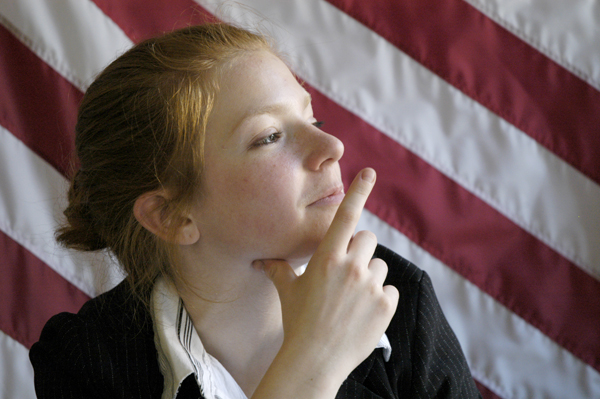|
Reviews of Recent Independent, Foreign, & Documentary Films in Theaters and DVD/Home Video
 FRONTRUNNERS
Of 25, 000 applicants, only three percent are accepted each year to Stuyvesant, one of the most competitive public high schools in the United States and the “crown jewel” of New York City’s school system. Filmmaker Caroline Suh gained inside access, following four candidates for the student union president from the start of the month-long race through the finish. This sounds like the formula for a brilliant campaign drama. Instead, Frontrunners is one of the most disappointing documentaries I’ve seen in years. First-time director Suh squanders reel after reel of potentially fascinating material. The background on the school, and the New York City system overall, is slim. None of the candidates is interviewed at great length about his or her interests, goals, personal life, thoughts about the election, or opinions about local, global, or national politics. Other Stuyvesant students are interviewed sporadically about these issues, but none in any depth. We learn very little about any of the candidates and issues. Any ethnographer or documentarian worth her salt will want to throw tomatoes at the screen. Frontrunners takes too much for granted and stays on the surface of its subject matter. The issue of race, for example, is raised, but the film never addresses why all four of the main candidates are white at a racially diverse school that is half Asian. It never addresses the issue of class, which might be even more sociologically interesting than race in this context. The film never becomes challenging or personal or takes any risks to reveal deeper truths. With so much missing, how does Caroline Suh fill 83 minutes? There’s lots of repetitive footage of the candidates handing out leaflets. It’s a shame that the background material provided in the press notes is entirely missing from the film. (For instance, the fact that Upper-Westsider candidate Hannah Friedman was educated at a private school before Stuyvesant is illuminating.) There are mildly interesting interviews with other Stuyvesant students, although all are superficial. Frontrunners has a number of strange and confounding cinematographic and editorial choices—the camera lingers on a candidate’s dog, moves away, then returns to the dog, or pans down the candidate’s body to her hands and back again. This makes sense if it reveals something—the student’s love for her dog, her nervousness, anything—but in Frontrunners, it seems senseless and accidental. Many other filmmaking choices are also inexplicable. Midway through, there’s a note that 80 votes were miscounted in the primary election, but no mention of how or why that happened. At the end, we’re given a full update on one candidate (he went to Harvard) and partial updates on two of the other candidates (one was in a Law and Order episode and another organized a school dance.) Why don’t we get to hear where they went to college, too? Who knows? Most frustratingly, the fourth candidate, Alex Leonard, goes unmentioned, as if he was never in the film at all. Yes, Alex seemed apathetic about the process and didn’t really campaign, but a probing filmmaker would’ve interviewed the kid about his world, why he chose to run at all, and why he was less gung-ho than the others. This weird omission is typical of the film’s slipshod vision. Throughout Frontrunners, I
frequently thought of Nanette Burstein’s American Teen, a recent
high-school documentary that’s as riveting as The Breakfast Club.
A more politically-oriented and even more successful project is Marion
Lipschutz and Rose Rosenblatt’s The Education of Shelby Knox.
Both of these films take a keen look at the contemporary adolescent
experience, showing how ambitious teens navigate high-school systems and
hierarchies, romances, and family relationships. They transform in
complex ways that are familiar to all of us. The Stuyvesant students in
Frontrunners are clearly as compelling as the teens in those
superior movies, and competent filmmakers could easily turn their
stories into a richly hilarious, sad, searing documentary version of
Election. Instead, the film comes up at least 80 votes short, and
frustratingly unconcerned about the miscount.
Elizabeth Bachner
|

